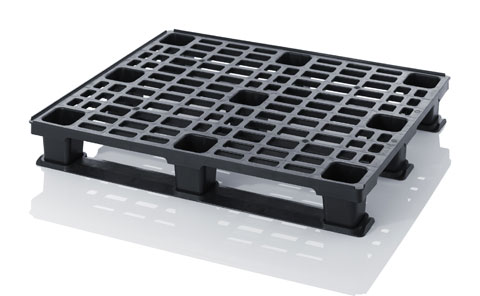Shipping Plastic Pallets
22 Mar 2018
It’s becoming more and more accepted that plastic shipping pallets have the edge on wooden pallets, but for those who haven’t yet made the move to plastic, you may be wondering why. Read on as we take a look at the benefits of shipping plastic pallets over shipping wooden pallets. From timber regulations to durability, plastic certainly has its charm when it comes to choosing a pallet for international shipping.

Timber Regulations
In some countries wooden pallets are subject to the same timber regulations as any imported wood. Some countries place restrictions on or even prohibit certain wood species from entering their borders. This means that if the wood used in the pallets is prohibited or restricted, drivers may be forced to unload and reload goods before entering the country.
Durability
Durability is, for many, the leading benefit of shipping plastic pallets. In fact, they are so durable that a plastic pallet is expected to live at least ten years – this is opposed to the three to five years expected of a wooden pallet. Plastic doesn’t allow water to ingress or seep in – unlike wood, where it can damage the integrity of the pallet and also encourage pests to take up residency. This means that plastic pallets can be used in all weathers, unlike wood. They can also be left outside for longer. Furthermore, pallets made from plastic are shock-absorbent and are therefore less likely to shatter or break up like wood might.
Safety and Hygiene
As well as being highly durable, for many users the safety factor is the key benefit. Plastic pallets don’t have nails or sharp edges which can cause injury to shipping staff, and there is no danger of encountering splinters, whilst a grooved anti-slip surface also improves the overall safety standard. As well as being safer for the individuals transporting and handling the pallets, they’re also safer for the end consumers of any food that is carried in them. Plastic pallets are easy to wash, which means they can be kept at an excellent food hygiene standard, unlike wood.
Environmentally Friendly
Despite being made from plastic, these pallets can actually be the more environmentally friendly choice. Their longevity of at least ten years means they need to be replaced far less often than wood, and the plastic can be ground up, melted and shaped for reuse as a new product when it does come to the end of its lifetime as a pallet.
As you can see, shipping plastic pallets certainly will have the edge over wood when it comes to international transportation, thanks especially to their durability and safety standards. They can also be the more environmentally friendly choice and allay any concerns over timber regulations.
